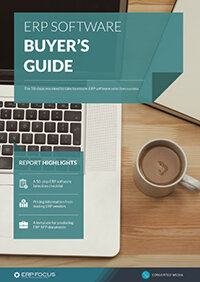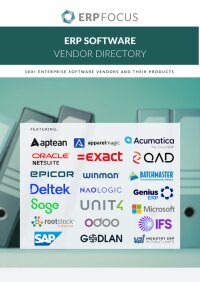Top ERP systems for small businesses
Finding the right ERP solution for a small business can be frustrating. Many systems target large enterprises, forcing smaller companies to pay for features they don’t need, while others lack essential tools, making it hard to scale.
Recommended reading: Find the right ERP for your small business with this step-by-step guide
This guide highlights ERP solutions for small businesses that balance cost, functionality, and flexibility to help you choose the best fit.
The best ERP systems for small businesses
Here are some top SMB ERP options worth considering:
Each offers distinct advantages depending on your industry and operational needs. Let’s explore them in detail. When you're ready, you can add them to your shortlist using our free ERP comparison tool.
SAP Business One
SAP Business One caters to small and midsize enterprises, providing a unified platform for finances, sales, CRM, inventory, and reporting without stitching together multiple tools.
- Access real-time data and built-in analytics dashboards.
- Choose on-premise or cloud deployment to fit your IT strategy.
- Expand functionality with additional modules and third-party integrations.
SAP B1’s flexible licensing allows you to scale from core accounting to advanced manufacturing and distribution, making it ideal for businesses in need of a comprehensive, scalable ERP.
Odoo Online
Odoo is an open-source suite covering eCommerce, accounting, CRM, inventory, point of sale, and more.
With over 30,000 community-contributed apps, an intuitive interface, and GDPR compliance, Odoo scales as your business grows.
A free self-hosted version is available, alongside cloud-based SaaS packages and expert consultants.
Choose an on-premises deployment on your server or a cloud-based implementation. Its modular design makes Odoo an ideal web-based ERP system for small companies.
DigitBridge
DigitBridge combines ERP, WMS, PIM, and commerce connectors into a unified cloud-native platform for small and midsize businesses. It automates order processing, inventory control, and financials while connecting sales channels and supplier workflows.
Key capabilities include:
- Omnichannel operations: Centralize order capture and fulfillment across Amazon, Shopify, and marketplaces with the Commerce Connector.
- Warehouse management: Optimize picking routes, barcode scanning, and real-time stock visibility across multiple locations.
- Product information management (PIM+): Create, enrich, and distribute product data to ensure consistency across eCommerce, B2B portals, and retail channels.
- Supplier and customer portals: Give partners self-service access to quotes, purchase orders, and order tracking, reducing manual inquiries.
With guided onboarding, dedicated support, and pay‑as‑you‑grow pricing, DigitBridge can go live in weeks, helping small teams streamline operations without adding IT overhead.
SAP Business One
SAP Business One is built for small and midsize businesses, offering a single platform to manage finances, sales, customer relationships, inventory, and reporting without the need for multiple tools.
With real-time data access, built-in analytics, and dashboards, it delivers instant insights to support smarter decisions. Flexible deployment options, on-premise or cloud, cater to different business needs and IT setups.
Scalable and adaptable, SAP B1 grows with your business through additional modules and third-party integrations.
Microsoft Dynamics 365 Business Central
Business Central unifies finance, operations, sales, and service in one role-based solution designed for small to mid-sized companies. It offers:
- Seamless integration with Office 365 and Power Platform.
- Real-time financial insights and customizable dashboards.
- Workflow automation with Power Automate.
- Flexible cloud or on-premises deployment.
Dynamics 365 BC’s tight Microsoft ecosystem integration drives productivity and ensures a consistent user experience.
Epicor Kinetic
Epicor Kinetic focuses on manufacturing and distribution for small and midsize businesses. Key features include:
- Advanced planning and scheduling for production efficiency.
- End-to-end traceability with batch and serial number tracking.
- Built-in analytics featuring interactive dashboards.
- Cloud-enabled mobile access for shop-floor operations.
Kinetic’s industry-specific modules and global support make it a strong option for small manufacturing businesses.
Why open-source ERP is gaining traction
Open-source options like Odoo and ERPNext deliver:
- Lower cost: No licensing fees for self-hosted deployments.
- Customization: Modify the code to meet specific workflows.
- Community support: Active developer and user communities.
For budget-conscious businesses, open-source ERPs provide an excellent alternative.
Tip: For minimal upfront costs and automatic updates, consider a cloud-based ERP solution.
A look at previous picks
Oracle NetSuite
A SaaS platform evolved from an accounting system into a full-featured ERP for growing SMBs. Key functions include financial management, GAAP accounting, integrated analytics, and supply chain management. Data security and browser support are enterprise-grade.
BizAutomation Cloud
Tailored to businesses with 10-250 employees, this SaaS ERP covers accounting, order management, CRM, sales commissions, eCommerce, and project planning at a low entry price. Ideal for small distributors and single-line manufacturers.
CGS BlueCherry
Designed for mid-market apparel manufacturers (50–100 users), offering on-premise and cloud options. Modules span planning, design, production, logistics, and business intelligence. Pricing is per module plus user fees.
xTuple Software
This best-of-breed ERP system is tailored to support SMBS. It supports GAAP accounting, sales, supply-chain, inventory, and various manufacturing modes. Available on-premise or in the cloud with online support.
Vendors who offer ERP software for SMBs also include:
- Sage
- SYSPRO
- abas ERP
- Genius ERP
Once you’ve used our white paper to help put together a shortlist of SMB ERP vendors, why not compare them with this free tool to see which ERP is the best fit for your business?
Free white paper

Small business ERP: five steps to success

Featured white papers
Related articles
-

Top free ERP and open source systems (plus hidden costs)
When it comes to free ERP software, it pays to remind yourself of the old adage ‘there ain’t no s...
-

How the right ERP can help you launch a successful omnichannel business
Petersen Zhu, CEO of DigitBridge and Vibes Base, shares how to create a scalable omnichannel stra...
-

28 cost elements to include in your ERP TCO calculation
With differing definitions and more hidden costs than you can shake a stick at, ERP TCO can be a ...



